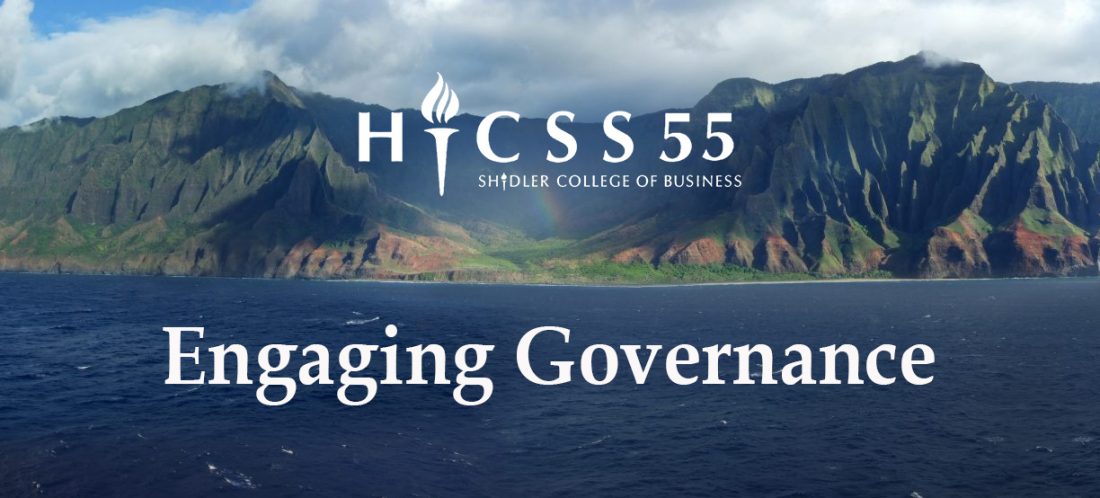
Call for Papers: Engaging Governance at the 55th Hawaii International Conference on System Sciences

CFP | Engaging Governance | 55th HICSS 2022 conference | fastracks Internet Research (IF 3.8) and | AIS Transactions on Human-Computer Interaction | Deadline June 15 2021
Link to full CFP: https://lobnahassan.com/2021/03/08/engaging-governance-minitrack-hicss2022/
=== Engaging Governance track
Part of the “Digital Government” – track 55th annual Hawaii International Conference on System Sciences HICSS January 4-7, 2022 | Hyatt Regency Resort, Maui
=== IMPORTANT DATES
– June 15: Submission deadline
– August 17: Notifications of decisions sent to authors
– September 22: Deadline for authors to submit the final manuscript (camera ready)
– October 1: Registration deadline for at least one author per paper
– January 4-7: Conference
– February 15, 2022 (date subject to change) (Optional) Submission deadline for extended versions of selected papers for Internet Research or AIS Transactions on Human-Computer Interaction
We highly welcome papers on the impact of COVID-19 on a variety of topics, including but not limited to: accessibility of spaces, health communication, promotion of vaccination campaigns, social behavior, and connected topics.
Authors of accepted papers have the option to fast-track extended versions of their HICSS papers either to Internet Research (Impact factor 3.838)
(http://www.emeraldgrouppublishing.com/products/journals/journals.htm?id=int
or AIS Transactions on Human-Computer Interaction
(https://aisel.aisnet.org/thci/).
Moreover, the Engaging Governance mini-track is part of the Gamification Publication Track aimed at the persistent development of gamification research: http://gamifinconference.com/gamification-track/
Submission instructions: https://hicss.hawaii.edu/authors/
=== Topics include (but are not limited to) the intersections between engagement and governance:
1) Engagement
– Game-based approaches: games, gamification, gamefulness, urban gamification, simulations, policy games, serious games, games with a purpose, game-based learning
– Motivational technology: persuasive technology, affective technology, quantified self, motivational theory
– Play: playfulness, toys, toyification
– Storytelling: narratives, stories, digital storytelling, interactive narrative, storification, roleplay
– Immersive technology: AR, VR, XR, digital twins
– User generated content: social media, social networks, memes, streaming
2) Governance
– Impact of COVID-19: accessibility of spaces, health communication, promotion of vaccination campaigns, social behavior, and connected topics
– Participation: e-participation, e-democracy, empowerment, co-creation, integration, diversity, accessibility
– Urban planning: smart cities, public spaces, resource management, commons, sustainability, IoTs
– Public data: open data, big data, data ownership, citizen sensing, crowdsensing visualization, information and misinformation
– Economy: national economy, sharing economy, information economy, taxation, market regulation
– Security and law enforcement: cybersecurity, surveillance, privacy, deception, organized crime, information warfare, digital forensics, e-justice
– Policy and politics: policymaking, law-making, voting, petitioning, post-truth politics, campaigning, elections, nudge politics, top-down vs bottom-up regulations
– Emergency response: disaster and resources management volunteer work
We encourage a wide range of submissions from any disciplinary backgrounds: empirical and conceptual research papers, case studies, and reviews.
=== CHAIRS
Lobna Hassan
Tampere University
Email: lobna.hassan@tuni.fi
Mattia Thibault
Tampere University
Email: mattia.thibault@tuni.fi
J. T. Harviainen
Tampere University
Email: tuomas.harviainen@tuni.fi
Juho Hamari
Tampere University
Email: juho.hamari@tuni.fi
See you in Hawaii!
====
Public engagement in the governance of shared resources and commons is often inhibited by several factors, such as the growing complexity of modern life, constraints of time or space, and the lack of interest to engage from both individuals and governing bodies. On the other hand, the increased digitalization of society and exponential technological developments have made participation in governance more technologically feasible than ever. Research and practice have sprung to investigate how emerging technologies could impact engagement in governance under such umbrellas as e-democracy (16), e-participation (21, 25), e-voting (26), e-petitioning (3), and online, participatory campaigning (11, 31), amongst many other governance engagement strategies.
Engagement with governance is often facilitated through various technological means and strategies. Among others, games, game-based and playful approaches (10, 22, 23) have been utilized in governance and public engagement practices, for example through simulations and policy games (10). Emerging and connected technologies and strategies are similarly being utilized to foster engagement with governance through social media (2, 8), gamification & gameful design (12, 13, 18, 19), serious games (7, 32), persuasive technology (24), virtual (28) and augmented reality (4, 27). For example: serious games are being utilized to foster civic learning (9), gamification to promote formal interaction between citizens and policy makers (10, 13, 15), and virtual reality as means of promoting empathy, integration and social connection (5). Many have, additionally, explored how public spaces, and especially smart cities, could be made more engaging to citizens, often in playful ways (14, 23). Smart cities can become playgrounds, where inhabitants, for better or for worse, shape the city’s landscape: its public areas, walkways, social interactions and makeups through technologies (8, 14, 20, 23, 30). Location-based games such as Pokémon Go (4) were able to attract millions of players, making cities friendlier as spaces where individuals felt safer and were more likely to create social connections with their neighbors. Concepts such as Hackable Cities (20, 34), Playable Cities (23), and Urban Gamification (33) highlight the large-scale change that emerging technologies are bringing about in the smart cities of the future. Moreover, social media and user generated content have become a key player in public life through, for example, political memes (2, 8, 11), and organization of political and city activities (20).
These emerging technologies and engagement strategies, amongst others, have shown and still hold a great potential for public engagement in governance. Nonetheless, engagement with governance and the public good can be seen to exist outside the common hurdles of the everyday life, where the effects of engagement are often invisible or take a long time to materialize (13, 18). While we could argue that the basic technological means for facilitating engagement in governance are available to remedy to the modern physical challenges that hinder exactly such engagement, public engagement with governance often swings between the extremes of being passive or active through logistically unsustainable online and offline movements engagement, such as has been seen with the Arab Spring (1, 17), occupy Wall Street movements (6), and some city alteration movements (20, 29, 34). Both, the lack of engagement in governance and unsustainable engagement with it are of detriment to governance and democratic practices.
References
- Abdelghaffar, H., & Hassan, L. (2016). The Use of Social Networks in Achieving e-Democracy in the Arab Spring Countries, International journal of E-Adoption (IJEA), 8(2), 17-33.
- Abdelghaffar, H., & Samer, L. (2016). Social development of rules: can social networking sites benefit e-rulemaking?, Transforming Government: People, Process and Policy, 10(2).
- Adams, N. J., Macintosh, A., & Johnston, J. (2005). E-petitioning: Enabling ground-up participation. In Challenges of expanding Internet: e-Commerce, e-business, and e-government (pp. 265-279). Springer, Boston, MA.
- Alha, K., Koskinen, E., Paavilainen, J., & Hamari, J. (2019). Why do people play location-based augmented reality games: A study on Pokémon GO. Computers in Human Behavior, 93, 114-122.
- Bollmer, G. (2017). Empathy machines. Media International Australia, 165(1), 63-76.
- Calhoun, C. (2013). Occupy wall street in perspective. British journal of sociology, 64(1), 26-38.
- Connolly, T. M. Boyle, E. A., MacArthur, E., Hainey, T. & Boyle, J. M. (2012). A systematic literature review of empirical evidence on computer games and serious games. Computers & Education, 59, 661-686.
- Effing, R., Van Hillegersberg, J., & Huibers, T. (2011). Social media and political participation: are Facebook, Twitter and YouTube democratizing our political systems?. In International conference on electronic participation (pp. 25-35). Springer, Berlin, Heidelberg.
- Fernandes, F. T., & Junior, P. T. A. (2016). Gamification aspects in the context of electronic government and education: A case study. In International Conference on HCI in Business, Government, and Organizations (pp. 140-150). Springer, Cham.
- Geurts, J. L., Duke, R. D., & Vermeulen, P. A. (2007). Policy gaming for strategy and change. Long Range Planning, 40(6), 535-558.
- Haleva-Amir, S. (2016). Not all about that Facebook: political campaigns and civic engagement in the 2015 elections. Israel Affairs, 22(3-4), 711-726.
- Hamari, J. (2019). Gamification. In G. Ritzer & C. Rojek (Eds.), The Blackwell Encyclopedia of Sociology. New York John Wiley & Sons. DOI: https://doi.org/10.1002/9781405165518.wbeos1321
- Hassan, L., & Hamari, J. (2019, January). Gamification of e-participation: A literature review. In Proceedings of the 52nd Hawaii International Conference on System Sciences.
- Hassan, L., & Thibault M. (2020) Critical Playable Cities. In: Nijholt A. (eds) Making Smart Cities More Playable. Gaming Media and Social Effects. Springer, Singapore.
- Harviainen, J. T., & Hassan, L. (2019). Governmental Service Gamification: Central Principles. International Journal of Innovation in the Digital Economy (IJIDE), 10(3), 1-12. doi:10.4018/IJIDE.2019070101.
- Kampen, J. K., & Snijkers, K. (2003). E-democracy: A critical evaluation of the ultimate e-dream. Social Science Computer Review, 21(4), 491-496.
- Khondker, H. H. (2011). Role of the new media in the Arab Spring. Globalizations, 8(5), 675-679.
- Koivisto, J., & Hamari, J. (2019). The rise of motivational information systems: A review of gamification literature. International Journal of Information Management, 45, 191-210.
- Landers, R. N., Auer, E. M., Collmus, A. B., & Armstrong, M. B. (2018). Gamification science, its history and future: Definitions and a research agenda. Simulation & Gaming, 49(3), 315-337.
- De Lange, M., & De Waal, M. (2019). The Hackable City. Digital media and collaborative city-making in the new society, 87.
- Macintosh, A. (2004, January). Characterizing e-participation in policy-making. In 37th Annual Hawaii International Conference on System Sciences, 2004. Proceedings of the(pp. 10-pp). IEEE.
- Mayer, I. S. (2009). The gaming of policy and the politics of gaming: A review. Simulation & Gaming, 40(6), 825-862.
- Nijholt, A. (2017). Playable Cities. Springer, Singapore.
- Peng, W., Crouse, J. C., & Lin, J. H. (2013). Using active video games for physical activity promotion: a systematic review of the current state of research. Health education & behavior, 40(2), 171-192.
- Phang, C. W., & Kankanhalli, A. (2008). A framework of ICT exploitation for e-participation initiatives. Communications of the ACM, 51(12), 128-132.
- Schaupp, L. C., & Carter, L. (2005). E‐voting: from apathy to adoption. Journal of Enterprise Information Management.
- Schowengerdt, B. T. (2017). U.S. Patent No. 9,791,700. Washington, DC: U.S. Patent and Trademark Office.
- Slater, M., & Sanchez-Vives, M. V. (2016). Enhancing our lives with immersive virtual reality. Frontiers in Robotics and AI, 3, 74.
- Smith, N., & Williams, P. (Eds.). (2013). Gentrification of the City. Routledge.
- Stevens, Q. (2007). The ludic city: exploring the potential of public spaces. Routledge.
- Stromer-Galley, J. (2019). Presidential campaigning in the Internet age. Oxford University Press.
- Susi, T., Johannesson, M., & Backlund, P. (2007). Serious games: An overview.
- Thibault, M. (2019) “Towards a Typology of Urban Gamification” in In Proceedings of the 52nd Annual Hawaii International Conference on System Sciences (HICSS), Hawaii, USA, January 8-11, 2019., pp. 1476-1485.
- de Waal, M., de Lange, M., & Bouw, M. (2017). The hackable city: citymaking in a platform society. Architectural Design, 87(1), 50-57.




Sorry, the comment form is closed at this time.